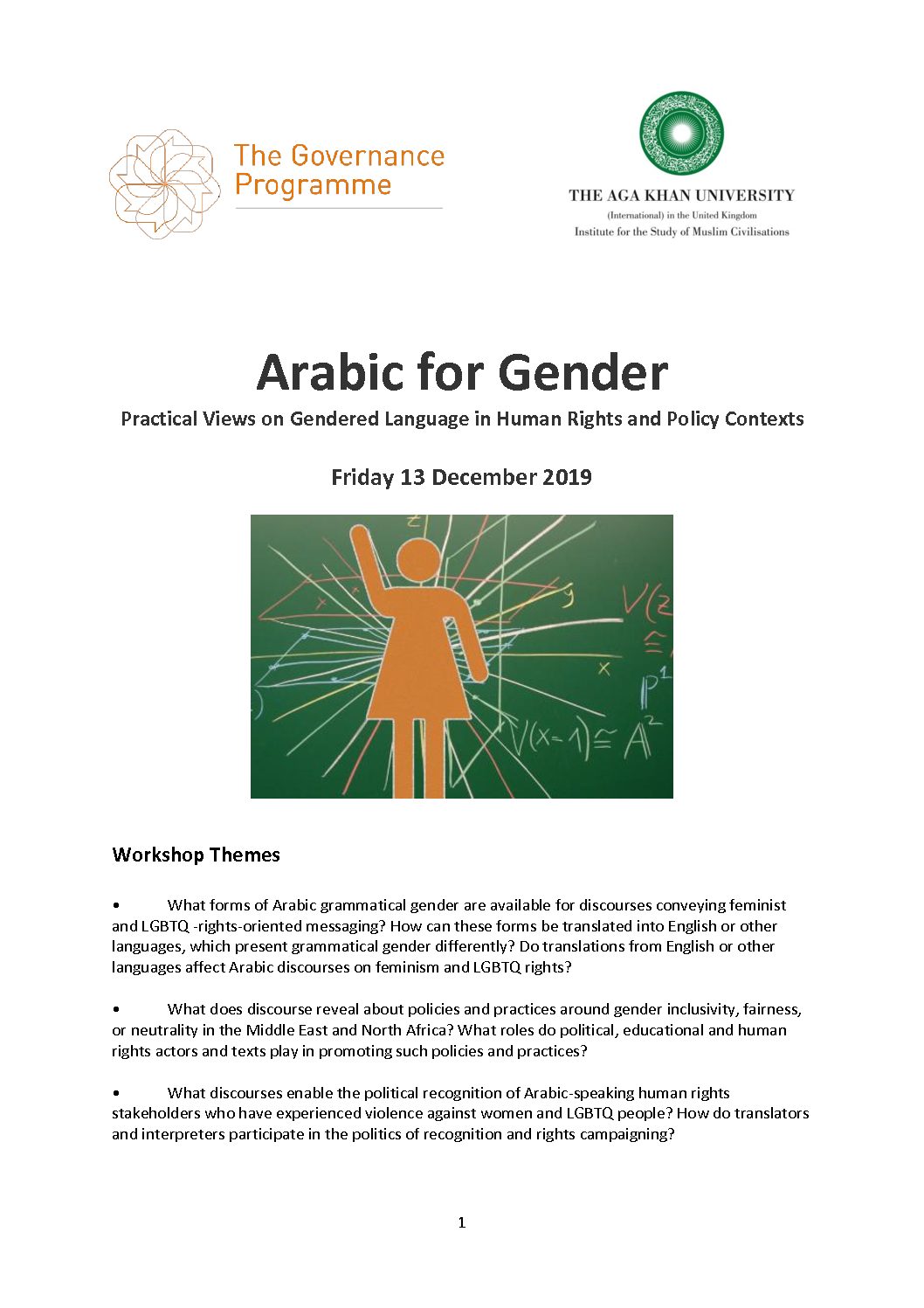Due to the Covid-19 pandemic, our calendar was temporarily suspended due to the cancellation and postponement of all kinds of meetings and events worldwide with the growing challenges brought on by the increasing spread of COVID-19. Our translation calendar will be published again soon.

- This event has passed.
Arabic for Gender Practical Views on Gendered Language in Human Rights, Education & Policy Context
13 December 2019

Gender and its representation in language are of paramount current importance. This is also true for Arabic at a time of globally changing norms on violence against women and against LGBTQ people. The language that communicates the realities of gender for Arabic-speaking stakeholders, including translations from and to Arabic, are central to policy responses and to the development of educational materials. However, the language itself, and how to understand it, is often taken for granted. Arabic is a gendered language, and some of the debates regarding gender-free formulations, like those discussions surrounding French, German, Spanish, Persian, and Turkish, have started in Arab practitioner, but not academic, circles. The problem of gendered formulations which prefer masculine forms poses a challenge for translation into English in particular, because English does not present grammatical gender in the same way as Arabic. English is the language of global governance and the language of human rights campaigning, and so the place of translation between Arabic and English needs to be considered in the policy context. Human rights stakeholders in the Middle East and North Africa, and women and LGBTQ people in particular, to some extent rely for political recognition on the mediation of their voices and narratives through non-governmental organisations (NGOs), and on gradual social change through education. The terminology and the sociology of this mediation will be examined in this workshop, in presentations and applied exercises looking at gender both in texts and in translators’ experiences.
The workshop aims to form a frame in which academics exchange knowledge about gendered language with human rights practitioners and policy-makers in a developing conversation.
From 10am to 5pm the Governance Programme will be hosting an intersectorial workshop looking at gender in translation, with seven presentations and two group activities. The presenters will be: Nadine El-Nabli, Riham Debian, Roula Seghaier, Maria Rosa Garrido Sardà, Leïla Kherbiche, Lara Antonios, and Tory Brykalski. The group activities will be facilitated by Wine Tesseur and Sanaa Alimia. The workshop will result in a working paper with reflections on, and suggestions for, best practices for the Arabic translation of policy texts with gendered inflections. Any specialist who would like to participate in the workshop can email ismc.governance@aku.edu with an expression of interest.
Download evening programme (open to public).
Keynote speakers:
Wassim Wagdy has about 20 years of experience in teaching Arabic as a foreign language. He is currently an examiner of Arabic translation at the British Institute of Linguists. He is a translator with a number of United Nations agencies including the UNESCO and the UNDP. Wassim taught Arabic at the Language Centre, SOAS, the University of London from 2000 until 2008. He taught translation at the Centre for Adult Education, the American University of Cairo, 1998-1999. He was a visiting lecturer in translation at the University of Westminster, 2004-2008; and a lecturer in Arabic at the University of Exeter, 2015-2017. Wassim worked for many years as a translator in the field of human rights starting with the Egyptian Organisation for Human Rights in 1992.
Prof Hilary Footitt, University of Reading. Prof Hilary Footitt recently co-edited The Palgrave Handbook of Languages and Conflict (2019). She combines four areas of research: women in politics, war and liberation in France, UK language policy, and languages in zones of war, conflict and development. She has led projects on the militarised use of languages for surveillance, propaganda and exclusion, and on the use of languages in non-governmental organisations. She has also advised the UK government on its language policy for education. Hilary Footitt’s previous publications include “Translation and War” in The Routledge Handbook of Translation and Politics (with Michael Kelly, 2018), “International Aid and Development: Hearing Multilingualism, Learning from Intercultural Encounters in the History of OxfamGB” in Language and Intercultural Communication (2017), and Women, Europe and the New Languages of Politics (2016).
Rothna Begum is a senior women’s rights researcher, working at Human Rights Watch since 2013. She has led the research and advocacy on the abuse and exploitation of migrant domestic workers in the Middle East, sexual violence and slavery of Yezidi women by ISIS in Iraq, the male guardianship system in Saudi Arabia, and on domestic violence in Morocco, Lebanon, and Iraq. She pushed for a new global treaty relating to violence and harassment at work, which was adopted in June 2019. She previously worked for Amnesty International, and holds LLB and LLM degrees.
Dina El-Mamoun is the Head of Mission and Country Director in Yemen for Geneva Call, and member of the UN’s Advisory Board on Gender Justice in the Middle East and North Africa, since 2019. She was the Head of Advocacy and Policy for Oxfam International in Yemen, and also the former Chief Technical specialist for the Human Rights Project during the transitional period in Yemen.
Organiser:
This workshop is organised by AKU-ISMC’s Governance Programme. The Governance Programme’s research activities and events explore how Muslim-majority societies and minority communities develop political systems that promote public welfare, achieve legitimacy and recognise individual and collective rights.
AKU-ISMC Conveners: Nancy Hawker, Sanaa Alimia and Gianluca Parolin.
Booking:
Evening keynotes are open to the public. Book as soon as possible.
Due to the Covid-19 pandemic, our calendar was temporarily suspended due to the cancellation and postponement of all kinds of meetings and events worldwide with the growing challenges brought on by the increasing spread of COVID-19. Our translation calendar will be published again soon.
